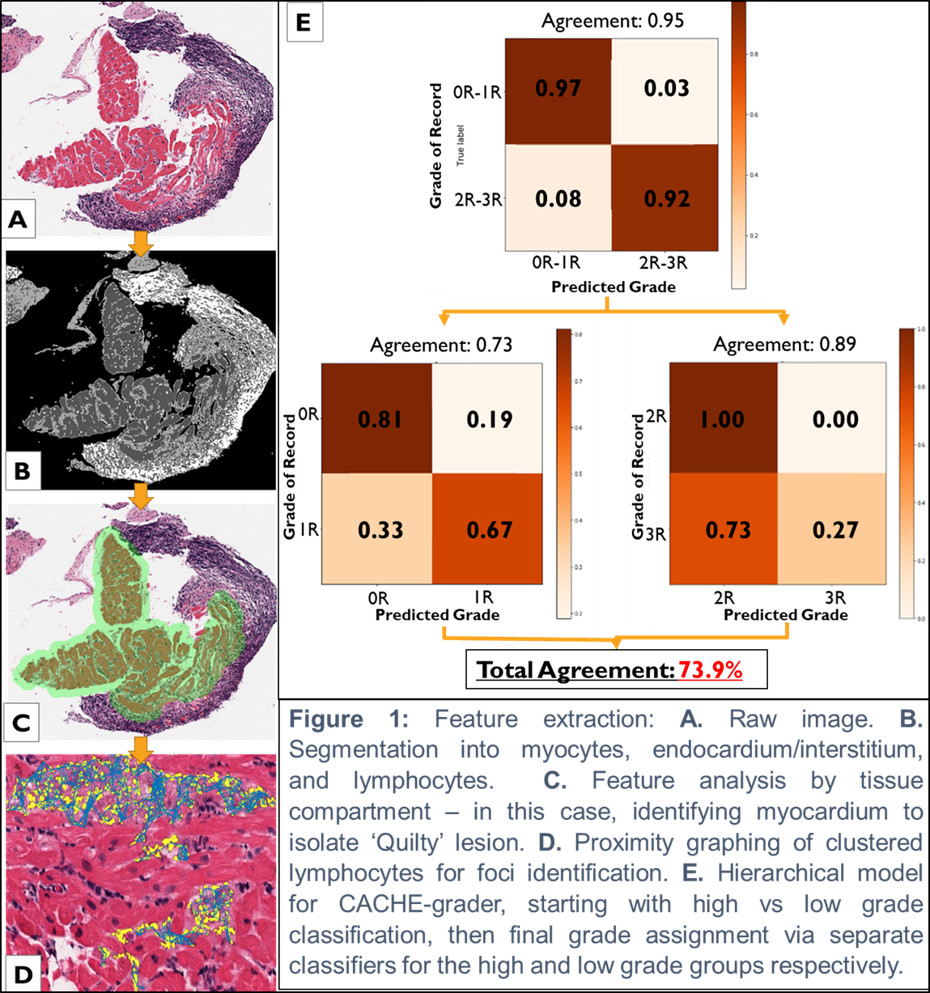Computer-Assisted Cardiac Histologic Evaluation (CACHE) for Grading Cardiac Allograft Rejection
1University of Pennsylvania, Philadelphia, PA, 2Case Western Reserve University, Cleveland, OH, 3University Hospitals Cleveland Medical Center, Cleveland, OH, 4Ohio State University, Columbus, OH
Meeting: 2020 American Transplant Congress
Abstract number: 77
Keywords: Heart, Histology, Image analysis, Rejection
Session Information
Session Name: Heart Transplantation: Antibodies and More
Session Type: Oral Abstract Session
Date: Saturday, May 30, 2020
Session Time: 3:15pm-4:45pm
 Presentation Time: 3:39pm-3:51pm
Presentation Time: 3:39pm-3:51pm
Location: Virtual
*Purpose: Cardiac allograft rejection (CAR) is a serious concern in heart transplantation, occurring in 30-40% of patients during the first year. Endomyocardial biopsy (EMB) with qualitative histologic grading is the guideline-directed standard for CAR diagnosis, but the clinical and research utility of this standard is hindered by poor inter-pathologist agreement. A more reliable and reproducible approach to CAR grading would enhance the quality of inter-facility research and could provide valuable clinical decision support. Here, we use computer-vision algorithms to develop an automated pipeline for reproducible CAR grading, and then validate it via comparison to expert pathologists in a large, multicenter cohort.
*Methods: The study consisted of 1108 digitized EMB slides from three transplant centers. A training-set of 789 slides was used to develop the ‘CACHE-grader’ using a ‘hand-crafted’ feature extraction approach (Fig 1). Starting with segmentation of lymphocytes, myocytes, and interstitium, additional features to identify lymphocyte foci and to resolve tissue compartments for regional characterization were added. Overall, we extracted and modeled 127 quantitative morphologic features to optimize CAR grade assignment. The CACHE-grader performance was validated via percent agreement with the historical grade of record in a test-set of 319 new slides, and then compared to the percent agreement between study pathologists performing re-grading to test for non-inferiority.
*Results: The CACHE-grader demonstrated 73.9% (95% CI: 68.8-78.7%) agreement with the historical CAR grade of record. The overall pair-wise inter-grader agreement amongst study pathologist was 57.1% (95% CI: 50.9-63.3%). The CACHE-grader met the threshold for non-inferiority to human pathologists with regards to inter-grader-agreement.
*Conclusions: These results suggest that quantitative morphologic features extracted from EMB histology slides are predictive of rejection grades. Moreover, the CACHE-grader platform developed in this work met a threshold of non-inferiority, agreeing with expert pathologists as often as they agree with one another. This work demonstrates the potential of computational histologic analysis platforms to reproduce clinical-quality diagnostic performance, with potential for standardizing grading across centers and as clinical decision support.
To cite this abstract in AMA style:
Peyster E, ArabYarmohommadi S, Janowczyk A, Sekulic M, Cassol C, Feldman M, Margulies K, Madabhushi A. Computer-Assisted Cardiac Histologic Evaluation (CACHE) for Grading Cardiac Allograft Rejection [abstract]. Am J Transplant. 2020; 20 (suppl 3). https://atcmeetingabstracts.com/abstract/computer-assisted-cardiac-histologic-evaluation-cache-for-grading-cardiac-allograft-rejection/. Accessed July 18, 2025.« Back to 2020 American Transplant Congress

